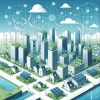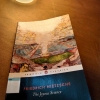What is Energy literacy and why is it important?
There are many definitions of energy literacy, which is has similar meanings. DeWaters and Powers define energy literacy as the domain of basic energy-related knowledge, coupled with an understanding of the impacts of energy production and consumption which means how energy is used in everyday life, and its effect on the environment, also the adoption of energy-saving behaviours.
According to the U.S. department of energy, energy literacy is an understanding of the nature and role of energy in the world and daily lives accompanied by the ability to apply this understanding to choose what energy source they use, how to maintain the resource sustain, to use the energy wisely and providing an effective solution to address long-term issues to solve the problems. Those definitions emphasise three different dimensions: knowledge, attitude, and behavioural intentions towards energy.
In modern society, energy plays a major role in the everyday functions of our life and access to energy is becoming a human right same as education or health, study shows that low literacy rate and inadequate health care facilities have arisen as consequences of poor energy access.
Nowadays, we are facing a challenge in our energy system which is unsustainable and heavily dependent on fossil fuels. In other words, we face three major transformations concerned, those are energy security of supply, and energy access that is cleaner and more sustainable with respect to combat climate change.
Our successful shift into a stable future will rely not only on qualified technical, scientific, and professional expertise, but also on the ability of the average citizen to make appropriate final energy choices, for instance, the mode of transportation, and domestic appliances they use in everyday life, voting habits based on environmental impacts, and acceptance of policies to support changes to the way we harness and consume energy, this is the reason why energy literacy is crucial for the energy transition. In other words, energy literacy encompasses not only the cognitive domain but also the affective and behavioural characteristics, enabling citizens to make appropriate decisions regarding the energy they use, this is in line with IAE's mention that people-centred transitions.
The previous study indicates that culture can complicate and hinder attempts at promoting more efficient, sustainable, and affordable energy use in homes or buildings as well as for low-energy for transport and mobility due to acknowledge barriers to low-carbon energy transition. According to this evidence, energy literacy is seen as a powerful tool that empowers citizens and helps them make informed decisions.
Does Indonesian understand where their electricity come from?
The history of Indonesia's electricity began at the end of the 19th century, even though large-scale electricity networks have existed since the 18th century. Initially, the first power plant in Indonesia was intended for sugar and tea factories since the Dutch colonial until Indonesia took over those companies when Indonesia become independent under the Ministry of Public Works and Power which was formed on 27 October 1945.
Since then, all electricity needs in Indonesia are supplied by only one company: the National Electricity Company (PLN) as the Holder of the Electricity Business Authority (PKUK) to provide electricity for the public interest. These circumstances is totally different if we compare with the situation in a developed nation such as Denmark, where the government encourage public participation in local technology development to deal with energy scarcity as an impact of oil crisis in 1970s.
Due to all electricity needs for the people in Indonesia is provided by the state, means that they do not necessarily know where their electricity come from and how to generate. The initial study has conducted in 2020 to capture energy literacy profile of junior high school student in Indonesia through quantitative descriptive design (open survey methods).










